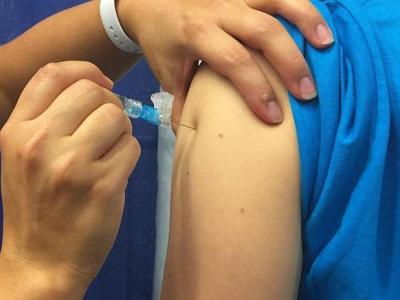Stewardship bundle tied to better antibiotic prescribing for virtual visits
A multifaceted stewardship intervention aimed at virtual visits was tied to improvements in guideline-concordant antibiotic prescribing for upper respiratory tract infections (URTIs) and sinusitis, University of Michigan researchers reported today in Infection Control & Hospital Epidemiology.
The intervention at Michigan Medicine was aimed at improving antibiotic prescribing for URTIs within E-visits, an asynchronous care delivery system in which patients fill out a questionnaire related to symptoms and advanced practice providers (APPs) respond with a written treatment plan.
The intervention included modifications of the existing questionnaire, the addition of a nudge for guideline-concordant prescribing in the electronic medical record, and audit and feedback of APP prescribing. To study the impact of the intervention on appropriate antibiotic prescribing for URTIs, researchers looked at all adult patients who completed E-visits for "cough," "flu," or "sinus" symptoms at Michigan Medicine before and after the intervention was implemented.
From January 2018 through September 2020, there were 5,151 E-visits for the included symptoms. Prior to the intervention, 43.2% of E-visits resulted in antibiotic prescriptions, compared with 28.9% of post-intervention visits. The number of prescriptions with guideline-concordant antibiotic selection rose from 37.9% to 66.1% for amoxicillin-clavulanate and from 13.8% to 22.7% for doxycycline. In addition, median antibiotic duration fell from 10 days to 5 days.
An interrupted time series analysis showed that guideline-concordant antibiotic prescribing increased significantly after the intervention and continued along a similar upward trend over time.
"This approach can aid stewardship efforts in the ambulatory care setting with increases in telemedicine," the study authors write.
Jan 31 Infect Control Hosp Epidemiol abstract
Stewardship strategies to optimize pediatric outpatient antibiotics
In another study published today in the same journal, researchers in Tennessee found that a bundled stewardship intervention was associated with improved appropriate ambulatory antibiotic prescribing for children, despite the COVID-19 pandemic.
The before-and-after study looked at guideline-concordant antibiotic use during three periods at five community general pediatrics practices in Tennessee. Each practice chose two to four implementation strategies known to be effective at reducing outpatient antibiotic use and implemented them in their practice over the entire study period.
Researchers held quarterly meetings with all providers to review de-identified peer comparison feedback across practices. Interventions included antibiotic-use commitment posters, parent education, development of local clinical practice guidelines, and electronic health record template changes.
The three study periods assessed were May 2018 to September 2019 (baseline, P1), Nov 11, 2019, to Mar 20, 2020 (pre–COVID-19 pandemic, P2), and Mar 21, 2020, to Nov 10, 2020 (pandemic, P3).
Improvements in guideline-concordant antibiotic use were observed in the pre–COVID-19 intervention period (P2) and were sustained during the pandemic (P3) for several diagnoses. These included otitis media (P1 72.14% vs P2 81.42% vs P3 86.11%), group A streptococcal pharyngitis (P1 66.13% vs P2 81.56% vs P3 80.44%), pneumonia (P1 70.6% vs P2 76.2% vs P3 100%), sinusitis (P1 76.2% vs P2 83.78% vs P3 82.86%), and skin and soft-tissue infections (P1 97.18% vs P2 100% vs P3 100%).
Practices with higher fidelity to the implementation strategies demonstrated higher guideline-concordant prescribing than those with lower fidelity.
In a survey conducted after the study, more providers reported referring to guidelines to make decisions about prescribing antibiotics following the intervention (38.9%), compared with a pre-intervention survey (5.6%).
"In conclusion, despite the COVID-19 pandemic, this study demonstrates that outpatient antibiotic stewardship implementation strategies are feasible in community general pediatrics practices that are not affiliated with an academic institution, and it provides a framework for real-world implementation of outpatient antibiotic stewardship," the study authors write.
Jan 31 Infect Control Hosp Epidemiol abstract
Study finds drop in resistance gene after fecal microbiota transplantation
A small study of hospital patients colonized with multidrug-resistant organisms (MDROs) found a reduction in the expression of antibiotic resistance genes following fecal microbiota transplant (FMT), South Korean researchers reported late last week in Antimicrobial Resistance & Infection Control.
The single-center prospective study involved patients colonized with vancomycin-resistant Enterococcus (VRE), carbapenemase-producing Enterobacteriaceae (CRE), or both, who underwent FMT from healthy, unrelated donors from May 2018 through April 2019.
The primary endpoint was the complete elimination of antibiotic resistance genes 1 month after FMT, and the secondary endpoint included decreased expression of resistance genes. All patient fecal samples were tested via real-time reverse transcription polymerase chain reaction (PCR) on days 1, 7, 14, and 28 for the quantification of VanA, blaKPC, blaOXA, and blaNDM genes.
Of the 29 patients who received FMT, 26 (59.3%) were infected with VRE, 5 (11.1%) with CPE, and 8 (29.6%) with VRE/CPE. The mean duration of MDRO carriage before FMT was 71 days. Sixteen patients (59.3%) received antibiotics before FMT, and 17 patients (63.0%) were treated with antibiotics after FMT. Median patient age was 51 years.
In a culture-dependent method, the expression of VanA and overall genes significantly decreased (P = 0.011 and P = 0.003, respectively) after FMT. In a culture-independent method, VanA, blaNDM, and overall gene expression significantly decreased over time after FMT (P = 0.047, P = 0.048, P = 0.002, respectively). Similar results were confirmed following comparison between each time point in both the culture-dependent and -independent methods.
Regression analysis did not reveal important factors underlying the genetic response after FMT. No adverse events were observed.
The authors say that while the sample size was small and the study did not include a control group, the findings suggest FMT could be an effective way to reduce antibiotic resistance gene expression and facilitate MDRO decolonization.
Jan 29 Antimicrob Resist Infect Control study














